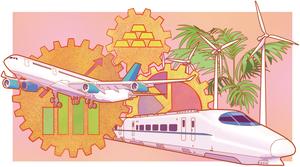 BRI a public road for public good.jpg
BRI a public road for public good.jpg
Addressing the Boao Forum for Asia through video link on Tuesday, President Xi Jinping said the Belt and Road Initiative is a public road open to all, not a private path owned by one single party.
By 2030, Belt and Road projects could help lift 7.6 million people out of extreme poverty and 32 million people out of moderate poverty across the world, Xi said, citing a World Bank report.
"We will act in the spirit of openness and inclusiveness as we work with all willing participants to build the BRI into a pathway to poverty alleviation and growth, which will contribute positively to the common prosperity of humankind," he said.
The WTO member states, on their part, should help the global trade body to adapt to the changes in the global economy, especially the technology revolution and global trade and investment rules
Themed "A World in Change: Join Hands to Strengthen Global Governance and Advance Belt and Road Cooperation", the ongoing annual conference of the Boao Forum for Asia 2021 is aimed at deepening cooperation among Asian countries and improving global governance in the post-pandemic period. The theme of the conference, being held in Hainan province from Sunday to Wednesday, is indicative of how Asia, and the rest of the world, can recover from the pandemic-induced economic recession and boost development through cooperation.
China proposed the Belt and Road Initiative to cope with the anti-globalization trend in the aftermath of the global financial crisis, and improve connectivity among related countries and regions through infrastructure construction, and free and open trade.
Indeed, the initiative has played an important role in boosting the regional and global economies. For instance, China-Europe freight trains transported anti-pandemic medicines and equipment, as well as other products in 2020 even when many countries were under lockdown. Also, trade between China and the European Union increased amid the global recession, with China replacing the United States to become the EU's largest trade partner.
Besides, China's non-financial direct investment in Belt and Road countries in 2020 reached US$17.79 billion, up 18.3 percent year-on-year, which proves the initiative has been facilitating economic and trade development.
However, in the post-epidemic period, the Belt and Road cooperation mechanism needs to be further improved in order to promote more balanced economic development. To begin with, since the 10 ASEAN member states, and China, Japan, the Republic of Korea, Australia and New Zealand have already inked the Regional Comprehensive Economic Partnership agreement, they should accelerate the process of ratifying the pact to build a high-quality free trade network in the Asia-Pacific region with the aim of helping boost global economic growth.
The digital economy is another sector that has drawn increasing attention since the novel coronavirus pandemic broke out. The combination of artificial intelligence, 5G technology, big data and cloud computing can give rise to new consumption and economic growth patterns. Also, with digital payment and digital currency becoming increasingly popular, countries will discuss how to avoid potential risks and strengthen international coordination on risk management.
And the "Digital Silk Road", an important part of the Belt and Road Initiative, can help countries build digital infrastructure and facilitate their digital transformation.
Moreover, as achieving sustainable development remains a challenge, the major goal of global governance should be to promote "green recovery" and realize the 17 goals of the 2030 Agenda for Sustainable Development. And since Asia is a densely populated region, Asian approaches should be explored to realize global sustainable development centered on green and circular economy, and focused more on regional development, including poverty reduction, rural sustainable development, using and protecting seas and marine resources, and plastic recycling.
As unilateralism and trade protectionism-along with the pandemic-have pushed the global economy into recession and destabilized the global financial system, it's important for Asia and the rest of the world to help build a consensus among major countries to promote multilateralism in global governance by defending the global trade order with the World Trade Organization at its core.
The WTO member states, on their part, should help the global trade body to adapt to the changes in the global economy, especially the technology revolution and global trade and investment rules, while the WTO needs to ensure all its member states can benefit from its organizational reform.
There is also a need to improve the international monetary and financing systems, and increase global coordination to strengthen financial support to emerging markets and developing countries, and establish a sustainable fund-raising system. In this regard, by improving connectivity and helping increase investment in the Asian and global financial markets, the Belt and Road Initiative will facilitate the development of the financial sector.
In short, by helping improve the economic situation in the region, the Belt and Road Initiative will contribute to Asia's development and global recovery.
The author is executive director of the Department of BRI Studies at the National Institute of International Strategy, Chinese Academy of Social Sciences.
The views don't necessarily represent those of China Daily.


